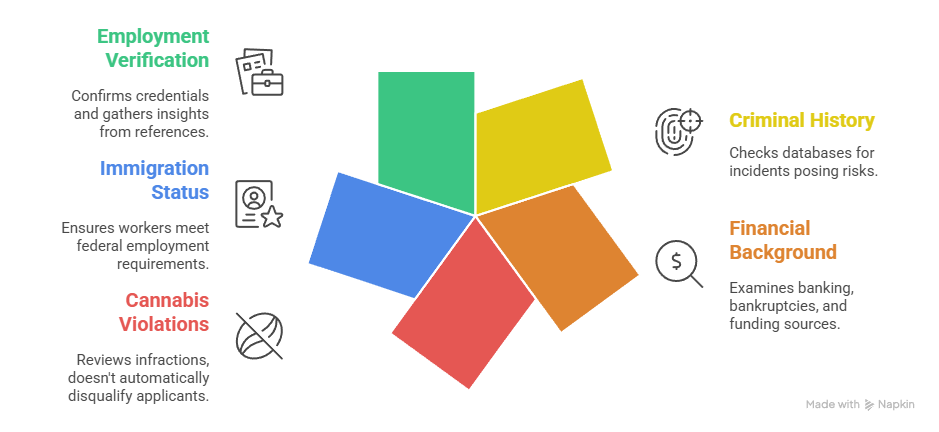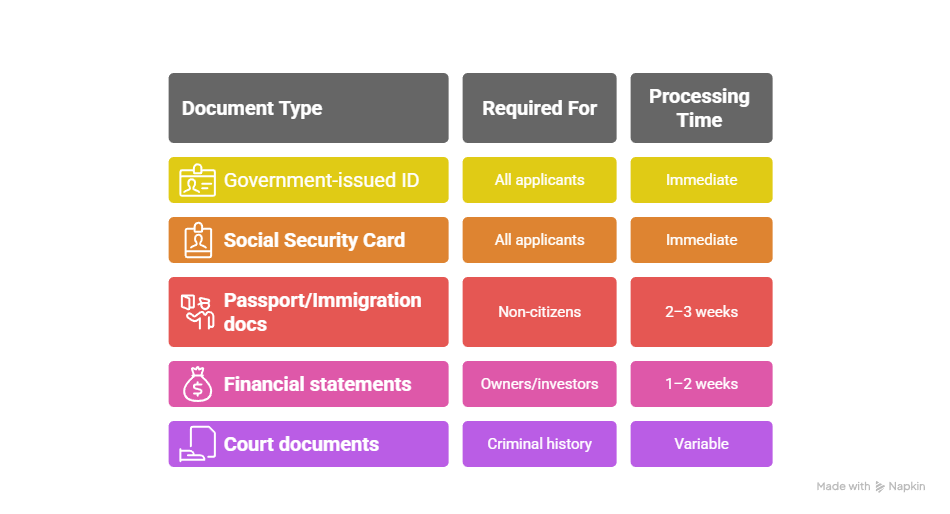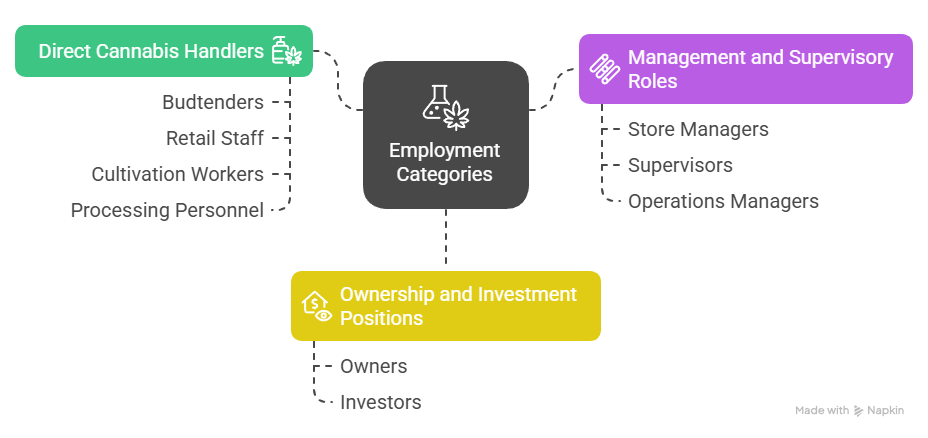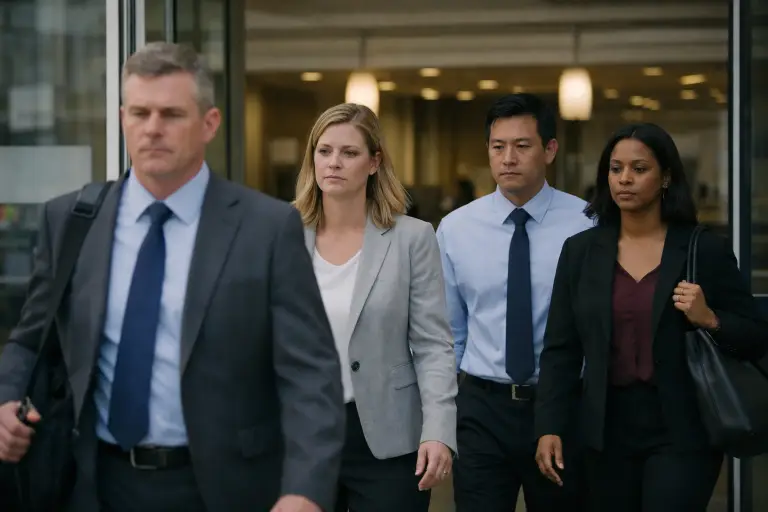Washington's cannabis industry operates under strict background check requirements governed by RCW 69.50 and administered by the Washington State Liquor and Cannabis Board (LCB), ensuring all personnel meet rigorous safety and compliance standards. These comprehensive screenings examine criminal history, financial records, and personal integrity across all employment levels, from budtenders to business owners.
Key Takeaways
- All cannabis industry positions in Washington require mandatory background checks through the LCB, with no exceptions for any role involving cannabis handling, management, or ownership.
- RCW 69.50 establishes the legal framework for screening requirements, balancing public safety concerns with regulatory compliance across the entire cannabis sector.
- Background checks examine multiple components including criminal history via FBI and Washington State Patrol databases, financial records for ownership roles, and immigration status verification.
- Processing typically takes 30-45 business days with fees ranging from $75 for standard employees to $150 for owners and investors, plus optional rush processing for an additional $100.
- Automatic disqualification occurs for felony convictions related to drug trafficking, violent crimes, or financial fraud within the past ten years, though appeals and discretionary reviews are possible.
- Employers must implement comprehensive screening programs with regular monitoring, detailed documentation, and secure data storage to maintain ongoing compliance with LCB regulations.
Understanding Washington Cannabis Background Check Requirements
Washington cannabis sector background checks operate under a comprehensive regulatory framework designed to maintain industry integrity and public safety. The Washington State Liquor and Cannabis Board (LCB) oversees these mandatory screenings for anyone involved in cannabis-related businesses, from entry-level employees to major investors.
The screening process examines multiple facets of an applicant's background. Criminal history receives thorough scrutiny through both Washington State Patrol and FBI databases, looking beyond surface-level infractions to assess overall suitability. Financial backgrounds undergo detailed review, particularly for ownership positions where fiscal responsibility directly impacts business operations. Immigration status verification ensures compliance with federal employment requirements, while employment and reference checks confirm the accuracy of provided information.
These requirements aren't merely bureaucratic formalities—they serve as critical safeguards for an industry operating in a complex legal landscape. The thoroughness of these checks reflects Washington's commitment to maintaining a legitimate, well-regulated cannabis market that prioritizes public safety while supporting economic growth.
Legal Framework Under RCW 69.50
Statutory Foundation and Scope
RCW 69.50 establishes comprehensive standards for cannabis industry background checks, creating a balanced approach between ensuring public safety and meeting regulatory compliance requirements. This legislation empowers the LCB to conduct thorough screenings across all cannabis business roles, including direct handlers, management personnel, security staff, delivery drivers, and individuals with significant ownership stakes.
The law's scope encompasses both criminal history evaluation and financial scrutiny, particularly for those seeking ownership or investment positions. Past violations of cannabis laws from any jurisdiction—regardless of where they occurred—fall under review as part of this comprehensive approach.
Regulatory Authority and Implementation
The LCB's implementation of RCW 69.50 creates uniform standards that prevent individuals with serious legal issues from entering the cannabis industry. This systematic approach includes detailed procedures for criminal background verification, financial status assessment, and compliance history evaluation. The framework ensures that both seasoned professionals and newcomers to the industry undergo identical scrutiny levels, maintaining consistent standards across all participants.
Key Background Check Components
Washington's cannabis background screening process incorporates several critical evaluation areas designed to assess applicant suitability comprehensively. Each component serves a specific purpose in maintaining industry integrity and regulatory compliance.
Criminal History Assessment: Comprehensive criminal background checks access both Washington State Patrol and FBI databases to identify any incidents that might pose risks to public safety or regulatory compliance. Clean records expedite the approval process, while any infractions require detailed review and context evaluation.

Financial Background Review: Financial scrutiny primarily applies to ownership and investment roles, examining banking relationships, past bankruptcies, and funding sources for cannabis investments. This evaluation ensures financial stability and legitimacy of all monetary contributions to cannabis businesses.
Cannabis Industry Violations: Previous infractions within any cannabis industry jurisdiction undergo thorough review, though past violations don't automatically result in disqualification. Applicants must provide detailed explanations and demonstrate compliance efforts since any regulatory missteps.
Immigration Status Verification: When applicable, immigration status checks ensure all workers meet federal employment eligibility requirements, preventing unauthorized employment while maintaining sector integrity across all personnel levels.
Employment and Reference Verification: Comprehensive verification of employment history and professional references confirms accuracy of provided credentials while gathering insights into applicant reliability, professionalism, and work ethic from previous supervisors and colleagues.
LCB Background Check Process: Step-by-Step Guide
Application Initiation and Form Requirements
The LCB background check process begins with completing Form MJ-09 (Personnel Application) through the state's online portal system. This comprehensive form requires detailed personal information including full legal name, aliases, complete address history covering the past decade, social security number, date of birth, and current contact information.
Employment history documentation must detail work experience for the previous ten years, including supervisor contact information, reasons for leaving each position, and explanations for any employment gaps. Financial disclosure requirements apply specifically to owners and investors, requiring detailed information about bank accounts, past bankruptcies, and complete documentation of cannabis investment funding sources.
Documentation Requirements and Processing

Proper documentation preparation significantly impacts processing efficiency and timeline accuracy. Having all required documents organized and readily available prevents frustrating delays and demonstrates applicant preparedness for the rigorous screening process.
Processing Timeline and Associated Costs
Standard background check processing requires 30-45 business days, though complex cases involving multiple jurisdictions or extensive criminal history may extend this timeframe considerably. The 2024 fee structure includes $75 for standard employee screenings, $150 for ownership/investor checks, $50 for renewal applications, and an additional $100 for rush processing when available.
Planning ahead becomes crucial for both applicants and employers, as these timelines and costs directly impact hiring schedules and operational planning. Early application submission helps avoid unnecessary stress while allowing adequate time for unexpected complications or additional documentation requests.
Disqualifying Factors and Criminal History
Automatic Disqualification Criteria
Certain criminal convictions result in automatic disqualification from Washington cannabis industry employment. Felony convictions related to drug trafficking, violent crimes, or significant financial crimes such as fraud within the past ten years create immediate ineligibility for all cannabis-related positions.
- Drug-Related Offenses: Felony convictions for trafficking large quantities of controlled substances demonstrate risk factors incompatible with regulated cannabis operations. These restrictions help ensure individuals with serious drug-related criminal backgrounds cannot access legitimate cannabis businesses.
- Violent Crime Convictions: Felony convictions for violent offenses within the past decade pose public safety concerns that warrant automatic disqualification from cannabis industry participation.
- Financial Crime History: Fraud, embezzlement, and other economic crimes raise questions about trustworthiness and financial integrity, particularly problematic in a heavily regulated industry requiring strict compliance with financial reporting requirements.
Prior violations within cannabis sectors from any jurisdiction also trigger automatic review processes, though these don't always result in permanent disqualification if circumstances warrant reconsideration.
Discretionary Review Factors
The LCB exercises discretionary authority when evaluating applications that don't meet automatic disqualification criteria but still present potential concerns. Time elapsed since incidents significantly influences these determinations, with older infractions receiving more favorable consideration than recent violations.
Demonstrated rehabilitation efforts carry substantial weight in discretionary reviews. Completion of relevant counseling programs, community service participation, sustained lawful employment, and positive character references can favorably influence LCB decisions. The severity of past offenses remains a critical consideration, with minor infractions receiving more lenient treatment than serious criminal violations.
Appeal Process and Reconsideration
Applicants facing denial retain the right to appeal LCB decisions through an administrative process. Appeal submissions must occur within 20 days of denial notification and should include comprehensive documentation supporting reconsideration requests.
Effective appeals typically include detailed explanations of circumstances surrounding disqualifying events, character references from respected community members, and concrete evidence of rehabilitation efforts. This appeals process provides opportunities for applicants to present compelling cases for reconsideration when initial reviews result in unfavorable determinations.
Employment Categories and Specific Requirements
Washington's cannabis industry background check requirements vary based on specific employment categories, with scrutiny levels escalating according to responsibility levels and potential impact on public safety. Understanding these distinctions helps applicants prepare appropriately for their desired positions.

Tier 1: Direct Cannabis Handlers
Direct cannabis handlers include budtenders, retail staff, cultivation workers, and processing personnel who have regular contact with cannabis products. These positions require clean criminal histories, particularly regarding drug-related offenses within the past ten years.
Budtenders and Retail Staff: Customer-facing roles demand trustworthy individuals with strong interpersonal skills and clean backgrounds. Previous customer service experience enhances candidacy, as these positions involve significant public interaction and product education responsibilities.
Cultivation and Processing Workers: These roles focus on safety protocol adherence and security standard compliance. Agricultural experience, while not mandatory, provides valuable background knowledge for plant cultivation and processing operations.
Tier 2: Management and Supervisory Roles
Management positions undergo enhanced screening that examines both criminal history and financial responsibility records. Store managers, supervisors, and operations managers must demonstrate leadership capabilities alongside regulatory compliance knowledge.
Leadership and Financial Responsibility: Management roles require individuals capable of ensuring business adherence to all regulations while maintaining operational efficiency. Financial stability and fraud-free backgrounds become essential for these positions.
Compliance Oversight: Operations managers must possess robust compliance knowledge and proven ability to maintain regulatory adherence across all business activities, making attention to detail and comprehensive understanding of cannabis regulations crucial qualifications.
Tier 3: Ownership and Investment Positions
Owners and investors face the most rigorous examination processes, including comprehensive financial background checks and funding source verification. License holders must disclose complete financial backgrounds, legal standpoints, and verify state residency requirements.
| Position Type | Key Requirements | Additional Scrutiny |
| License Holders | Complete financial disclosure, residency verification | Banking statements, investment details |
| Financial Interest Holders | Ownership percentage documentation | Funding source legitimacy, ethics evaluation |
| Major Investors | Detailed financial documentation | Investment acquisition means, transparency requirements |
These positions require transparent documentation of all financial relationships and investment sources to ensure legitimacy and regulatory compliance throughout the ownership structure.
Compliance Best Practices for Employers
Implementing Effective Screening Programs
Employers must develop comprehensive screening programs that verify candidate eligibility before LCB submission, saving time and resources while ensuring compliance from the hiring process's outset. Thorough reference checks and qualification verification form essential components of due diligence efforts.
Regular monitoring of employee status changes, license renewals, and regulatory updates helps maintain ongoing compliance. Establishing systematic reminder systems for critical compliance tasks prevents oversight and ensures timely completion of required renewals and re-screenings.
Documentation requirements demand meticulous record-keeping for all hiring decisions, including detailed rationales for employment and termination decisions. Secure storage of sensitive employee data protects privacy while maintaining accessibility for compliance audits and regulatory reviews.
Documentation and Record-Keeping Standards
Comprehensive employee files must include application materials, background check results, and all relevant communications throughout the employment relationship. Clear documentation of hiring and termination reasons provides essential audit trails for regulatory compliance demonstrations.
Secure data storage systems protect sensitive information while ensuring authorized personnel access for legitimate business purposes. Regular compliance audits help identify potential issues before they become serious problems, maintaining operational integrity and regulatory adherence across all business activities.
Common Challenges and Solutions
Application Delays and Documentation Issues
Incomplete or inaccurate documentation frequently causes application delays that frustrate both applicants and employers. Ensuring all forms contain accurate personal information and thorough employment histories prevents common setbacks that extend processing timelines unnecessarily.
Criminal history complications require proactive preparation, including gathering relevant court documents and preparing explanatory statements for any past infractions. Character references supporting rehabilitation efforts and personal growth can significantly strengthen applications when criminal history raises concerns.
Interstate Background Check Complications
Multi-state employment histories introduce additional complexity requiring coordination with agencies across different jurisdictions. Each state maintains distinct regulations and record-keeping systems, potentially lengthening processing times when comprehensive employment verification spans multiple states.
Planning for extended processing periods when dealing with interstate complications helps manage expectations while ensuring adequate time for thorough background verification. Clear communication with applicants about potential delays prevents misunderstandings and maintains engagement throughout extended review processes.
Electronic Background Check Systems
Modern electronic systems streamline background check processes while providing enhanced security and faster processing times. These platforms offer automated reference checks, document scanning capabilities, and instant credential verification that significantly improve efficiency over traditional manual methods.
FCRA compliance remains essential when implementing electronic systems, ensuring personal data receives required legal protection throughout the screening process. Biometric technologies like fingerprinting and facial recognition add security layers while reducing identity fraud risks in sensitive cannabis industry positions.
Emerging Compliance Requirements
Federal legalization developments may significantly impact Washington's cannabis background check requirements, potentially creating dual state and federal compliance obligations. These changes could streamline interstate operations while increasing regulatory complexity through overlapping jurisdictional requirements.
Artificial intelligence and analytics integration promises real-time compliance tracking capabilities that predict potential violations before they occur. These technological advances may revolutionize background check processes by providing faster, more accurate applicant assessments while maintaining rigorous security standards.
- Industry Standardization Trends: Professional certifications for compliance roles and continuous education requirements gain importance as the industry matures. Standardized practices across states improve both employee experiences and operational efficiency while supporting long-term industry growth.
- Technology Integration Benefits: AI-powered compliance tools, blockchain record verification, and automated monitoring systems enhance accuracy while reducing processing times and administrative burdens for both employers and regulatory agencies.
Staying informed about emerging trends and preparing screening processes accordingly positions businesses advantageously in this evolving regulatory landscape while ensuring continued compliance with developing requirements.
Conclusion
Washington cannabis sector background checks represent comprehensive screening processes essential for maintaining industry integrity and public safety under RCW 69.50 requirements. Success requires thorough preparation, accurate documentation, and understanding of the multi-tiered evaluation system that examines criminal history, financial status, and personal integrity across all employment levels. Employers must implement systematic screening programs with regular monitoring and meticulous record-keeping to ensure ongoing compliance with LCB regulations. As the industry continues evolving with emerging technologies and potential federal changes, staying informed and adaptable remains crucial for navigating these complex requirements successfully.
Frequently Asked Questions
What types of criminal history automatically disqualify applicants from Washington cannabis jobs?
Felony convictions for drug trafficking, violent crimes, or financial fraud within the past ten years result in automatic disqualification from all cannabis industry positions. Additionally, prior violations of cannabis regulations from any jurisdiction undergo strict review and may lead to denial depending on circumstances and rehabilitation efforts.
How long does the LCB background check process typically take?
Standard background checks require 30-45 business days for completion, though complex cases involving multiple states or extensive criminal history may take longer. Rush processing is available for an additional $100 fee when circumstances permit expedited review.
What documents are required for cannabis industry background checks?
All applicants need government-issued identification and Social Security cards, while non-citizens must provide passport or immigration documentation. Owners and investors require detailed financial statements, and individuals with criminal history need relevant court documents for comprehensive review.
Can applicants appeal background check denials?
Yes, Washington provides an administrative appeal process for denied applications. Appeals must be submitted within 20 days and should include detailed explanations of past incidents, character references, and evidence of rehabilitation efforts to support reconsideration requests.
Do background check requirements differ based on cannabis job positions?
Background check requirements vary by position tier, with direct cannabis handlers facing standard criminal history screening, management roles requiring additional financial responsibility verification, and ownership positions undergoing the most comprehensive financial and legal scrutiny.
What are the current fees for Washington cannabis background checks?
The 2024 fee structure includes $75 for standard employee background checks, $150 for ownership and investor screenings, and $50 for renewal applications. Rush processing, when available, costs an additional $100 beyond standard fees.
How often must cannabis industry employees renew their background checks?
Background check renewal requirements depend on specific positions and licensing requirements, with most employees needing periodic re-screening to maintain compliance. Employers should monitor renewal dates and submit applications well before expiration to avoid compliance gaps.
Additional Resources
- Washington State Liquor and Cannabis Board Official Website
https://lcb.wa.gov/ - RCW 69.50 - Uniform Controlled Substances Act Full Text
https://app.leg.wa.gov/RCW/default.aspx?cite=69.50 - Form MJ-09 Personnel Application Portal
https://lcb.wa.gov/licensing/marijuana-licensing - Washington State Patrol Background Check Services
https://www.wsp.wa.gov/crime/criminal-history/ - Fair Credit Reporting Act (FCRA) Compliance Guidelines
https://www.ftc.gov/business-guidance/resources/fair-credit-reporting-act - Cannabis Industry Legal Updates and News
https://www.cannabisbusinesstimes.com/ - Professional Cannabis Compliance Training Programs
https://www.cannabistraininguniversity.com/

GCheck Editorial Team
Meet the GCheck Editorial Team, your trusted source for insightful and up-to-date information in the world of employment background checks. Committed to delivering the latest trends, best practices, and industry insights, our team is dedicated to keeping you informed.
With a passion for ensuring accuracy, compliance, and efficiency in background screening, we are your go-to experts in the field. Stay tuned for our comprehensive articles, guides, and analysis, designed to empower businesses and individuals with the knowledge they need to make informed decisions.
At GCheck, we're here to guide you through the complexities of background checks, every step of the way.





